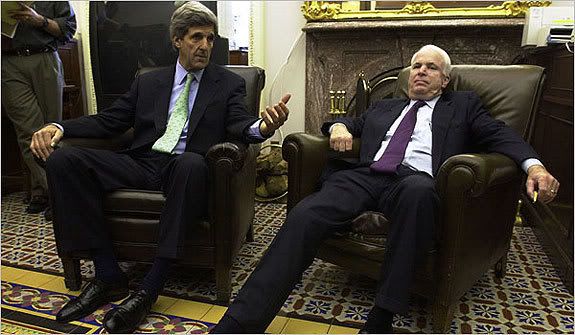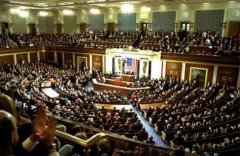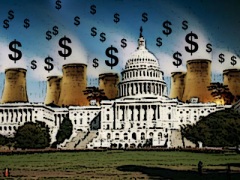A Tottering Technocracy
August 9, 2011
Here and in Europe, the financial meltdown exposes the hollowness of our elites.
by Victor Davis Hanson
National Review
August 9, 2011
We are witnessing a widespread crisis of faith in our progressive guardians of the last 30 years. These are the blue-chip, university-certified elite, employed by universities, government, and big-money private foundations and financial-services companies. The best recent examples are sorts like Barack Obama, Eric Holder, Larry Summers, Peter Orszag, Robert Rubin, Steven Chu, and Timothy Geithner. Politicians like John Kerry, John Edwards, and Al Gore all share certain common characteristics of this Western technocracy: proper legal or academic credentials, ample service in elected or appointed government office, unabashed progressive politics, and a free pass to enjoy ample personal wealth without any perceived contradiction with their loud share-the-wealth egalitarian politics.
The house of a John Kerry, the plane of an Al Gore, or, in the European case, the suits of a Dominique Strauss-Kahn are no different from those of the CEOs and entrepreneurs who were as privately courted as they were publicly chastised. These elites were mostly immune from charges of hypocrisy or character flaws, by virtue of their background and their well-meaning liberalism.
The financial meltdown here and in Europe revealed symptoms of the technocracy’s waning. On this side of the Atlantic, Geithner, Orszag, Summers, Austan Goolsbee, Paul Krugman, and Christina Romer apparently assumed that some academic cachet, an award bestowed by like kind, or a long-ago-granted degree should give them credibility to advocate what the tire-store owner, family dentist, or apple farmer knew from hard experience simply could not be done — borrow or print money on the theory that insular experts, without much experience in the world beyond the academy or the New York–Washington financial and government corridor, could best direct it to productive purposes.
But now they have either left government or are no longer much listened to — and some less-well-certified accountant will be left with the task of finding ways to pay back $16 trillion. Abroad, at some point, German clerks and mechanics are going to have to work a year or two past retirement age to pay for those in Greece or Italy who chose to stop working a decade before retirement age — despite all the sophisticated technocratic babble that such arithmetic is reductive and simplistic.
In the devolution from global warming to climate change to climate chaos — and who knows what comes next? — a small group of self-assured professors, politicians, and well-compensated lobbyists hawked unproven theories as fact — as if they were clerics from the Dark Ages who felt their robes exempted them from needing to read or think about their religious texts. Finally, even Ivy League and Oxbridge degrees and peer-reviewed journal articles could not mask the cooked research, the fraudulent grants, and the Elmer Gantry–like proselytizing about everything from tree rings and polar-bear populations to glaciers and the Sierra snowpack. A minor though iconic figure was the truther and community activist Van Jones, the president’s “green czar,” who lacked a record of academic excellence, scientific expertise, or sober and judicious study, assuming instead that a prestigious diploma and government title, a certain edgy and glib disdain for the masses, and media acclaim could permit him to gain lucre and influence by promoting as fact the still unproven.
Higher education is no longer affordable for many families, and does not guarantee well-rounded, well-educated graduates. A university debt bubble, in Fannie and Freddie fashion — together with the rise of no-frills private online certificate-granting institutions — is undermining traditional higher education. The symptoms are unmistakable: tuition spiraling far ahead of inflation; elite faculty excused from teaching to publish esoteric articles in little-read journals; legions of poorly compensated part-time instructors and graduate-student assistants subsidizing the privileged class; political orthodoxy as an unspoken requisite for membership in the club. An administrator is deemed successful largely for promoting “diversity” — rarely on the basis of whether costs stabilized, graduation rates increased, the need for remediation declined, or post-graduation jobs were assured on his watch. This warped system, which grew out of the bountiful 1960s, is now a vestigial organ, an odd-looking thing without an easily definable purpose. When will the bubble burst? If the four-year university cannot ensure its graduates that they will necessarily have a better-paying job and know more than the products of an upfront credentialing factory, why incur the $200,000 cost and put up with the political indoctrination?
Kindred media elites in Europe and the United States lauded supposed technocratic expertise without much calibration of achievement. Indeed, to examine the elite media is to unravel the incestuous nature of power marriages and past loyal service to heads of state. Those who praised Obama as a god or attributed their own nervous tics to his omnipresence or reported on his brilliant policies often either had been speechwriters to past liberal presidents, enjoyed family connections, or were married to other New York or Washington journalists or powerbrokers. Their preferences about where to send a kid to school, where to vacation, and what to think were as similar to those they reported on as they were foreign to those who were supposed to listen to them. Like wealthy people in the Middle Ages who bought indulgences instead of truly repenting their sins, the more our elites preached about egalitarian politics for the fly-over upper middle classes, the less badly they felt about their own mannered conniving for privilege and status.
A generation ago, we were supposed to be grateful that a few gifted and disinterested minds were digesting our news for us each day on cash-rich ABC, CBS, NBC, NPR, and PBS, and in the New York Times, Washington Post, and Los Angeles Times, summarized periodically on weekend network discussion groups and in newsweeklies like Time and Newsweek. Now the market share of all these enterprises is shrinking. Some exist only because of government subsidy, rich parent companies, or like-minded wealthy benefactors.
The technocratic pronouncements from on high — that Barack Obama was “sort of GOD,” or at least “the smartest president in history”; that a Harvard-trained public-policy wonk alone knew how to save us from a roasting planet — are now seen by most as laughable. An education-age Reformation is brewing every bit as earth-shattering as its 16th-century religious counterpart.
There are also generic signs of the technocracy’s morbidity. It deeply distrusts democracy, most recently evidenced by John Kerry’s rant that the media should not even cover the Tea Party, and by the European Union’s terror of allowing the public to vote on its intricate financial bandaging. It is no accident that technocratic journalists love autocratic China — with its ability to promote mass transit or solar panels at the veritable barrel of a gun — while hating the Tea Party, which came to legislative power through the ballot box.
So the elites’ furor grows at those who seek and obtain power, exposure, and influence without the proper background, credentials, or attitude. How else to explain why a Michele Bachmann or Sarah Palin earns outright hatred, whereas a Mitt Romney or John McCain received only partisan disdain?
There is an embarrassing lack of talent and imagination in the last generation of the technocrats. One banal memo about a “tea-party downgrade” or a “jihadist” takeover of the Republican party is mimicked by dozens of politicians and journalists who cannot think of any more creative phraseology. Calls for civility are the natural accompaniment to unimaginative slurring of those outside the accustomed circle. When Steven Chu exhorts us that gas prices should match European levels or assures us that California farms will blow away, should we laugh or cry? Do learned attorneys general call the nation “cowards,” refer to fellow minority members as “my people,” or really believe that they can try the self-confessed terrorist architect of 9/11 in a civilian court a few yards from the scene of his mass murder? Was Timothy Geithner really indispensable in 2009 because other technocrats swore he was?
We are living in one of the most unstable — and exciting — periods in recent memory, as much of the received wisdom of the last 30 years is being turned upside down. In large part the present reset age arises because our political and cultural leaders exercised influence that by any rational standard they had never earned.



